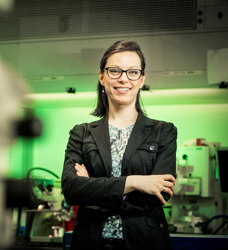Prof. Dr.-Ing. Ulrike Steinmann
 |
Prof. Steinmann studied Industrial Engineering at the OVGU and received her doctorate in 2008 in the field of novel piezoelectric sensors on the subject of "Lateral field excited quartz crystal resonators - From theoretical approach to sensor application". Motto: Everything is technically feasible, but not everything that is technically feasible also makes sense. |
Career
|
Education: |
1996-2002 |
Degree in Industrial Engineering for Electrical Engineering - majoring in Information Electronics, Otto von Guericke University Magdeburg |
|
Doctorate: |
2008 |
Faculty of Electrical Engineering and Information Technology, awarded the dissertation prize of the University Magdeburg |
|
Work: |
2002-2008 |
Scientific assistant at the Institute for Micro and Sensor Systems (IMOS), |
|
2009-2013 |
Head of the Research Unit Measurement and Analysis Systems, Mechatronic Systems Division, Institute for Automation and Communication (ifak) e. V. Magdeburg |
|
|
2013-2017 |
Deputy Business Unit Manager Metrology & Power Electronics and Senior Engineer Process Metrology, |
|
|
since 2017 |
Head of the Chair of Measurement Technology, Faculty of Electrical Engineering and Information Technology, Otto von Guericke University Magdeburg |
The decision to study Industrial Engineering for Electrical Engineering was made as a result of an information day organized by the OVGU. Originally, I wanted to become a teacher or study Physics, but this course, which was quite new at the time, convinced me of its potential. During my studies, my interest in Measurement Technology grew more and more, so after successfully completing my diploma, I gratefully accepted the job offer from my doctoral supervisor, Prof. Peter Hauptmann.
Today I deal a lot with ultrasound technology, for example with so-called time-reversal acoustics. Waves are emitted from a sound source, suitably recorded at several points, the signals are mirrored over time and then sent back to the propagation medium. These waves run back through the medium and focus exactly at the point where they originally originated. As if the movie was being played backwards. Among other things, this is a method that has been tried and tested in medical technology to generate high sound energy in a focused manner at special positions within a target volume.
Motivation
The choice of subject that I focus on today was strongly influenced by my doctorate at the OVGU and my time at the Institute for Automation and Communication (ifak) e. V. Magdeburg. I had the pleasure of working with great colleagues and that increases the enjoyment factor at work enormously.
What I like most about my current job is the great variety of topics and in the job profile. No day is like the next one and when we master a big challenge as a team, it makes me very proud.
Requirements
My job is shaped by research and teaching in engineering. So, if you are interested in devoting yourself to new technological questions, trying out solution strategies and enjoying communicating the research results to students and young academics, you are in the right place in this field of work.
In my job it is essential to have the constant ability to inspire students for the subject at hand and to always have an open ear for them and their problems.
Advice
In retrospect, I would have liked to have acted more confidently earlier in my career and would recommend that to others.
I think it already helps a lot for young female academics to see a female lecturer or mentor and to overcome any reservations. My working group currently comprises 7 research assistants as PhD students or Postdocs; 4 of them are female. I think that is a very good ratio and I really appreciate the composition of my team.
I would like to highlight a special funding instrument of the OVGU: the funding of conference trips and research stays for PhD students and female post-docs by the Office for Gender Equality. It is an ideal opportunity for our female scientists to network and become internationally visible. In my opinion, being noticed in the community is key to being defined in terms of scientific performance instead of gender.
Stand up for your work with conviction and you’ll get noticed. Don't wait to be spoken to, speak to interesting people yourself and be proactive. This is the only way people will remember you.
Female researchers are creative, bring different points of view into a team and, last but not least, are a key to women in future management positions.
Challenges
Unless there are acute short-term problems, I've gotten into the habit of always letting at least one day pass before I react. This helps me to get a more objective view on things and I am able to approach the solution in a better manner.
As a woman, I have always had excellent support in my field - both professionally and privately. That is not always a given and I am very grateful for my situation. I don't ask myself what could possibly have turned out better if I was a man.
Women need to communicate their goals clearly and not hope that career ambitions will somehow be discovered. You should have the courage to take on difficult tasks from time to time and replace doubts about competence with self-marketing and not be discouraged by mistakes, but learn instead. Building a good network (of women) is also extremely helpful.







